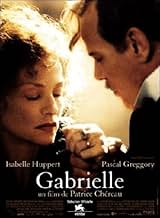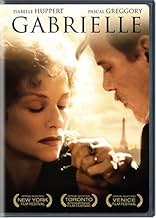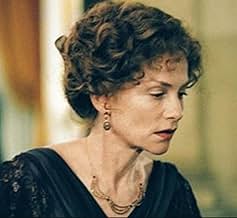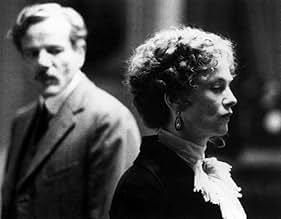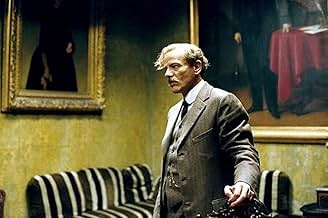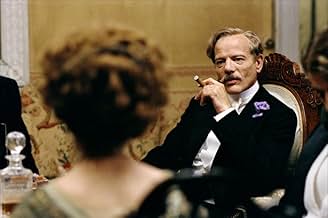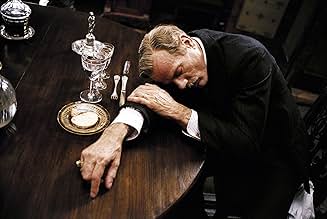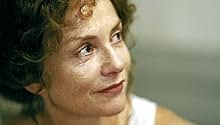Gabrielle
- 2005
- 1 h 30 min
AVALIAÇÃO DA IMDb
6,2/10
2,2 mil
SUA AVALIAÇÃO
Adicionar um enredo no seu idiomaThe marriage between Gabrielle and Jean begins to fray after the discovery of a letter that belongs to Gabrielle.The marriage between Gabrielle and Jean begins to fray after the discovery of a letter that belongs to Gabrielle.The marriage between Gabrielle and Jean begins to fray after the discovery of a letter that belongs to Gabrielle.
- Direção
- Roteiristas
- Artistas
- Prêmios
- 3 vitórias e 6 indicações no total
Florent Bigot de Nesles
- Invité
- (não creditado)
Philippe Calvario
- Guest
- (não creditado)
- Direção
- Roteiristas
- Elenco e equipe completos
- Produção, bilheteria e muito mais no IMDbPro
Avaliações em destaque
Gabrielle (2005) is a French film written and co-directed by Patrice Chéreau. It's based on a novella by Joseph Conrad.
Pascal Greggory plays Jean Hervey. He's a very wealthy businessman. He's healthy and apparently happy.
His wife, Gabrielle, is elegant and sophisticated, albeit aloof. Gabrielle is portrayed by Isabelle Huppert.
This movie sounded good on paper, but it just didn't work for me. Partly that's because Patrice Chéreau is better known as a theater director and the film looks more like a play than it looks like a movie.
Huppert is one of my favorite actors, but she's wrong for this role. We're told over and over that the couple has been married ten years, but Huppert looks closer to 50 when, in context, she should be 35 or 40. (Well, she was 52 at the time, and she has every right to look 50, but it's not appropriate for this movie.)
Finally, director Chéreau uses strange and unnecessary devices. He switches from black-and-white to sepia to color. He uses title cards like the old silent movies. The characters talk and talk, but nothing much gets said.
If a film isn't going to be enjoyable, it should teach us something. All I learned from this movie is that if you speak cruelly to your maids, they just have to bear it. Apparently, it's part of the job description to just endure.
I didn't enjoy any aspect of this film. It's hard for me to criticize an Isabel Huppert movie. I thought she could make it work. Not this time. Gabrielle has a dreadful IMDb of 6.4. I agree with my fellow raters and rated it 6.
Pascal Greggory plays Jean Hervey. He's a very wealthy businessman. He's healthy and apparently happy.
His wife, Gabrielle, is elegant and sophisticated, albeit aloof. Gabrielle is portrayed by Isabelle Huppert.
This movie sounded good on paper, but it just didn't work for me. Partly that's because Patrice Chéreau is better known as a theater director and the film looks more like a play than it looks like a movie.
Huppert is one of my favorite actors, but she's wrong for this role. We're told over and over that the couple has been married ten years, but Huppert looks closer to 50 when, in context, she should be 35 or 40. (Well, she was 52 at the time, and she has every right to look 50, but it's not appropriate for this movie.)
Finally, director Chéreau uses strange and unnecessary devices. He switches from black-and-white to sepia to color. He uses title cards like the old silent movies. The characters talk and talk, but nothing much gets said.
If a film isn't going to be enjoyable, it should teach us something. All I learned from this movie is that if you speak cruelly to your maids, they just have to bear it. Apparently, it's part of the job description to just endure.
I didn't enjoy any aspect of this film. It's hard for me to criticize an Isabel Huppert movie. I thought she could make it work. Not this time. Gabrielle has a dreadful IMDb of 6.4. I agree with my fellow raters and rated it 6.
9RNQ
Patrice Chéreau and his team continue to amaze. Their recent movies--"Intimacy" and "Son frère"--have been wild, and Isabelle Huppert has played some wild roles too. But "Gabrielle" is a masterpiece of control, an equal of the studio movies of Fritz Lang in the 1940s. A benchmark is Hitchcock's "Rebecca." Like those movies, every shot here, each turn of the head, is a statement of emotion (and a test of the actors' skill). Now not only music tells what the characters are doing, light is further nuanced with color. The almost-homage to black-and-white is astonishing, because it can also be lit into color, showing the characters' being forced to be here and now without escaping to old assumptions: a bitten lip bleeds red, a serving woman elaborately brings a softly glowing lamp upstairs. (A friend objects that the house has electricity, but the same friend puts candles on the dinner table, and this lamp has a purpose.) There's a thesis in Film Studies for the communicative devices of each scene and what is referenced, like the way there is a less flamboyant version of scenes in Ruiz's "Le temps retrouvé." But then being restrained is the theme, and the tension is extreme without any thunderstorm or overt thrill (a thrill for these characters might be the horror). If the source story was Conrad's homage to Henry James, here is a movie worthy of their capacity for narrative of the highest watchfulness and precision. Stay totally alert, movie goers.
Joseph Conrad wrote his novella, "The Return" in tribute to Henry James, whose "The Spolis of Poynton" inspired him to write about a man who regards people as objects of ownership-- and is gobsmacked when his most prized possession, his wife, walks out on him. On the page it's a tight little chamber piece, with overtones of Ibsen and Strindberg. On the screen the great Patrice Chereau turns it into something else -- an opera in which the images sing rather than the performers. Pascale Greggory is in top form as a haute bourgeois "man who has everything" whose smugness masks a total disdain for feeling. When the superb Isabelle Huppert leaves a note to say she's leaving, the brandy decanter he drops echoes like the sword of Siegfried in Chereau's famed production of Wagner's "Ring" cycle. (Fabio Vacchi's amazing Alban Berg-like score seals the deal on this aspect of the work.) The dramatic set-to that results finds our non-hero groping for words to speak to the feelings he's never experienced before -- longing, regret, and finally grief at the loss of a love he's never allowed himself to know.
As far from Merchant-Ivory as one can possibly imagine Chereau and production designer Olivier Radot (new to la famille Chereau) place the action in a museum-like mansion where a small army of servants move about at the service of this infernal couple and their friends. Scenes of their fashionable parties suggest the Verdurins in Proust with cinematographer Eric Gauthier indulging in a color palette that makes the screen seem like a Manet come to life.
Chereau is doubtless familiar with what Georges Bataille wrote of Manet: "A little superficial perhaps, but driven by inner forces that gave him no rest, Manet was possessed by a desire for something beyond his reach which he never fully understood and which left him for ever tantalized and unsatisfied, on the brink of nervous exhaustion." That's perfect description of the emotional heart of this very great film.
As far from Merchant-Ivory as one can possibly imagine Chereau and production designer Olivier Radot (new to la famille Chereau) place the action in a museum-like mansion where a small army of servants move about at the service of this infernal couple and their friends. Scenes of their fashionable parties suggest the Verdurins in Proust with cinematographer Eric Gauthier indulging in a color palette that makes the screen seem like a Manet come to life.
Chereau is doubtless familiar with what Georges Bataille wrote of Manet: "A little superficial perhaps, but driven by inner forces that gave him no rest, Manet was possessed by a desire for something beyond his reach which he never fully understood and which left him for ever tantalized and unsatisfied, on the brink of nervous exhaustion." That's perfect description of the emotional heart of this very great film.
French language period set chick flick that was so banally turgid and pretentious that I wanted to scratch thine own eyes out in those brief lucid periods I was awake. One thing I did share with what I expect the females in the audience were experiencing was the shedding of tears, the stark difference being that mine were tears of blood. If it had been a play I would have rushed out, brought a gun, then rushed back to shoot the actors on stage for in my opinion they deserve nothing but death. Put briefly, in turn of the century Paris a rather arrogant man rather abruptly finds out that his wife of 10 years desires to leave him for another man. Much talking is done. Then much more talking is done. This is followed by lengthy periods of talking. More talking. Then wrapped up with, surprisingly, talking. But it's all done in an almost monologue method , briefly interspersed with large titles on screen which I expect the makers of the movie thought to be profound yet I found completely ridiculous (the film ends with the words "AND HE NEVER RETURNED!". I thought it rude of me to puke on the floor of so gorgeous a theatre (the State in Sydney, such a beautiful and elaborate place) so I resisted with all my might). I left the cinema with a headache. Not in any way due to the complexity and depth of the story I'd just seen, but because I just wasted what I now consider to be the most valuable 90 minutes of my life ever. Even now I want to cry.
I see a great number of art-house films, so I'm not a pop culture heathen and I own many great titles in my own private DVD collection that I watch and treasure. I have nothing against glacial pacing, indeed for many wonderful films it is often delicious to slowly savour the unfolding occurrences (In My Fathers Den, Lantana, Insomnia, Mar Adentro etc) and my own favorites are indie films like Requiem For A Dream and Mysterious Skin (tho honestly a film one need watch only once due to its power and disturbing subject matter). But in this instance I would never have thought a "French language art-house drama" would be the type of film that in my opinion, gives the Adam Sandler film The Waterboy a run for it's money.
Complete dross.
I see a great number of art-house films, so I'm not a pop culture heathen and I own many great titles in my own private DVD collection that I watch and treasure. I have nothing against glacial pacing, indeed for many wonderful films it is often delicious to slowly savour the unfolding occurrences (In My Fathers Den, Lantana, Insomnia, Mar Adentro etc) and my own favorites are indie films like Requiem For A Dream and Mysterious Skin (tho honestly a film one need watch only once due to its power and disturbing subject matter). But in this instance I would never have thought a "French language art-house drama" would be the type of film that in my opinion, gives the Adam Sandler film The Waterboy a run for it's money.
Complete dross.
I saw this dark oeuvre yesterday at the Boston French Film Festival at the MFA.It was chosen to be the Opening night Film and was sold out.The director was present and spoke at length about what drew him to make the film and what was important about it- for him. I felt the film-making was fascinating. From the opening sequence, where the footage in the train station is SO realistic in its early 20th c. appearance, and throughout the film, I found the cinematography to be lush, stylized, extremely well-framed and riveting .It is a perfect voice for the story. The actors are always IN YOUR FACE and this fact, combined with an economic and well written script, heavy dark music, tremendously accurate and effective set design, and spot-on acting, made for an extremely moving and interesting exploration of the story. For me, in tone and context, it felt a bit like Henry James' Portrait of a Lady (and probably works by Ibsen and others) Isabelle Huppert and her husband are extremely wealthy, cold, unemotional,detached from themselves and others, and 'safe' in that world. Their house-where 99% of the film takes place, is a dark, heavy, classical, structured prison.(The director's background in stage directing is very evident in this film.) One little bubble bursts from that prison and then things change and the disintegration begins. It gives one a great deal to think about. My only problem with the film is the MUSIC.The music is as much an element of the film as the actors. That is not, in and of itself, a bad thing, but in the last 20 minutes of the film, it is just WAY TOO MUCH: too heavy, too loud, and too repetitive;a bit like Bruchner at his worst. But if you are able to see a DVD of this, you can turn down this overkill. If you are lucky enough to see the film live (so important for major artistic cinematography like this) you'll just have to deal with it; maybe it won't bother you so much.At any rate, the film will provide those so inclined with many things to think about and discuss. And visuals to remember. For me,I will always carry the image of Huppert, dressed in black, on that enormous settee... it's a Degas.
Você sabia?
- ConexõesReferenced in Lei & Ordem: Crimes Premeditados: Blind Spot (2006)
Principais escolhas
Faça login para avaliar e ver a lista de recomendações personalizadas
- How long is Gabrielle?Fornecido pela Alexa
Detalhes
Bilheteria
- Faturamento bruto nos EUA e Canadá
- US$ 332.829
- Fim de semana de estreia nos EUA e Canadá
- US$ 30.676
- 16 de jul. de 2006
- Faturamento bruto mundial
- US$ 2.775.311
- Tempo de duração
- 1 h 30 min(90 min)
- Cor
- Mixagem de som
- Proporção
- 2.35 : 1
Contribua para esta página
Sugerir uma alteração ou adicionar conteúdo ausente

